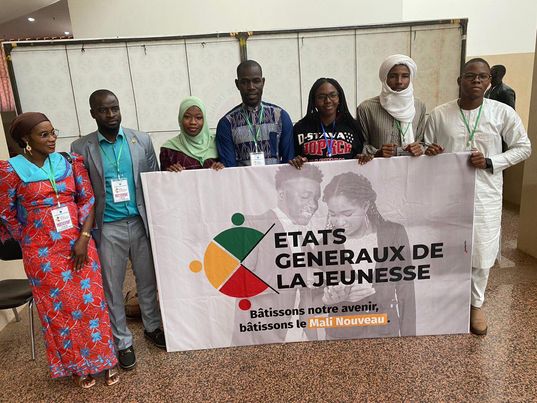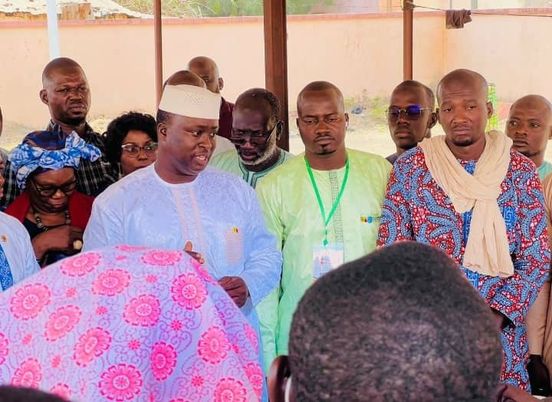Mali: Young people play a pivotal role in rebuilding the country

79.20% of Malians are under 35, out of a population estimated at over 22 million – according to the 5ème Recensement Général de la Population et de l’Habitat. To improve the position of Mali’s youth at the end of 2023, a large event was held in the form of the États Généraux de la Jeunesse (EGJ).
This year’s EGJ facilitated exchange and debate between young people and public decision-makers. Forums were held across 600 communes, 19 regions and through 31 diplomatic representations in the diaspora. Some 40,000 young people took part, tasked with diagnosing, and reflecting on solutions to the concerns of young Malians.
The closing ceremony was attended by the highest authorities of the country, including the President of the Transition, Colonel Assimi Goita. It was during this event that the youth shared the recommendations they drew up during the event – 256 in total – with Colonel Assimi Goita.
Overhauling governance codes and practices
From 2019 to 2020, NIMD Mali funded research on values in cultural areas concerning governance and democracy in Mali. The study revealed that perceptions of democracy and governance vary according to socio-cultural and geographical areas. One of its conclusions recommends rethinking democracy, or at least the conditions under which it is implemented, to correspond to local realities, thus facilitating people’s adherence to democratic principles.
Over the past years, in part together with our partners, NIMD Mali has worked towards strengthening democratic debate in Mali.
On the one hand by amplifying Malian voices during period of political renewal but also through sharing the perspectives of the citizens with national decision makers to ensure that the citizens’ voices are taken into account in the political and institutional reforms on the transition agenda.

Training the builders of Mali Kura
Through its PoD (Power of dialogue) and PREFODEP (Programme d’École de Formation Démocratique et Politique) programmes, NIMD supports multiple different political groups across the political spectrum – including the youth and women’s organizations grouped within the Consortium des organisations civiques et politiques de jeunes et de femmes (COCPJF).
The Consortium, as explained by its spokesman Mamadou Sanssi Bah, actively participated in the various phases of the Etats Généraux. “The young people from the political parties divided themselves up between the seven thematic groups and formulated proposals designed to take into account the pleas made by the COCPJF.” According to Sanssi Bah, a member of the EGJ organizing committee, “there was a lack of elements taking into account certain specific concerns of Malian youth in general, and political youth in particular. These concerns include the introduction of a theme linked to governance, political and institutional reforms; including young people in conflict prevention and resolution; and representation of young people in decision-making bodies.” His presence on this commission enabled these elements to be integrated into the working group discussions.
Alums from NIMD Mali’s Democracy Schools were also at the heart of the EGJ, participating in the debates and, above all, reporting on the work of the national phase. Mady Kama Diawara – an alumnus of the Fily Dabo Sissoko group of NIMD’s Democracy School – took part in the EGJ as an assistant-expert for example. Working in a team to for example “assist participants in better guiding the exchanges by facilitating understanding of the various questions included in the questionnaire” or “to compile the multiple reports from the communal and regional levels and carry out the work of validating the reports at national level.”
Taking part in the closing ceremony, the alums and members of the Consortium heard a strong message from the Head of State, as Fanta C Karembé emphasized.
“His Excellency Colonel Assimi Goita, Head of State, reaffirms his commitment to implementing the conclusions and recommendations of the États Généraux de la Jeunesse.”
In the meantime, the recommendations resulting from the EGJ will be translated into actions in a Strategic Framework, specifying “the activities to be implemented in the short, medium and long term.” There are also plans to set up a framework for monitoring the implementation of the recommendations. According to Mady Kama,
the EGJ allowed young people to make 256 recommendations, through which they committed themselves to playing their full role and occupying their rightful place in the process of rebuilding the State. The recommendations address all aspects of the nation’s life and will be translated into concrete action.